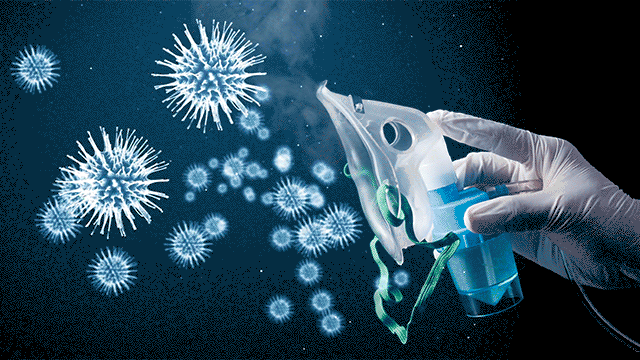‘Rookie error’: More exposure sites named as quarantine air gaps appear


A nebuliser used by a returned traveller in hotel quarantine has been linked to a coronavirus outbreak. Photo: TND/Getty
A medical device notorious for spraying “thousands of times more aerosol” than a breath has been linked to a growing coronavirus outbreak at a Melbourne quarantine hotel.
Leading epidemiologists fear a lack of fresh air in residents’ rooms could be exacerbating the problem.
The New Daily reported on Tuesday that, despite recommendations after the inquiry into quarantine, just one of the Victorian hotels allows its residents access to fresh air – through open windows or balconies – and exercise breaks.
Now, the state’s chief health officer Brett Sutton has offered an “evolving theory”, pointing to a breathing machine known as a nebuliser in a positive case’s room as the likely culprit.
He said the nebuliser could have carried the virus into the hotel’s corridor and exposed an authorised officer, a food and beverage worker and a returned traveller.
The device belongs to person who is in in intensive care, and who is believed to have contracted COVID-19 overseas.
As of Wednesday night, the Holiday Inn cluster had grown to eight and more sites were added to the list of possible exposure sites by Thursday morning.
The Victorian Government said it “is taking a precautionary approach and strongly encouraging” shoppers who may have been exposed to the virus to get tested and isolate.
It advised anyone who was at Sunbury Square Shopping Centre on Friday 5 February between 3:40pm and 4:30pm to “urgently seek testing and isolate until they receive a negative result”.
Two sites in Glen Waverley were also added to the list:
- Commonwealth Bank, Glen Waverley
- HSBC Bank, Glen Waverley.
A person with coronavirus had been at the banks on Tuesday afternoon.
Authorities in other states are watching the outbreak for signs the new cases could threaten areas outside of Victoria.
Already, South Australia has snapped shut its border to anyone coming from Melbourne.

The Holiday Inn at Melbourne Airport. Photo: Holiday Inn
Nebulisers were banned
Speaking on ABC radio on Wednesday afternoon, Corrections Victoria Commissioner Emma Cassar said returned travellers were banned from using nebulisers in hotel quarantine because they posed a risk for airborne transmission.
Nebulisers have been banned in hospitals since the early days of the pandemic.
However, Ms Cassar said staff had not been allowed to search residents’ luggage prior to quarantine, and said there may have been a misunderstanding of the rules.
“We’re relying on returned travellers’ honesty, but they also need to understand what these devices are (in order to declare them),” she told the program.
Since Wednesday’s finding, nurses have been granted permission to search residents’ luggage through a bag scanner.
“I’m sure they didn’t believe they were doing the wrong thing, but we are taking extra steps to make sure those machines are not in the hotel,” Victorian Premier Daniel Andrews said.
“This was a personal machine. It will be linked to this underlying condition, whether it’s asthma or something like that.”
A nebuliser is commonly used by people with asthma or other respiratory issues, and is placed over their face while it pumps pressurised air through liquid – usually a medicine like Ventolin – to form a fine mist.
Some health experts have slammed the incident as a “rookie error”, warning nebulisers are known to turbocharge the spray of aerosol droplets.
https://twitter.com/KArandjelovic/status/1359335151763746818
‘No excuse’ for no fresh air
Professor Marylouise Mclaws, a World Health Organisation adviser from UNSW, backed Professor Sutton’s theory about the nebuliser but slammed authorities for failing to provide adequate air ventilation in the hotels.
“The nebuliser could build up particles that then escape every time you open the door,” she said, adding a WHO report released on June 5 made it very clear that air flow needed to be a consideration in hotel quarantine.
“There is no excuse that authorities should not have known that in a quarantine hotel, which is a bit like a proxy hospital – though it shouldn’t be – should have at least 10 full air changes per hour, per person in the room.”
Monash University’s Daniel Duke said it was too early to say if nebulisers can increase the spread of COVID-19 specifically, the machines are known to “increase aerosol quantity significantly”.
Dr Duke said nebulisers were “purposefully designed to produce thousands of times more aerosol than natural breathing”.
“If they happen to be shedding a lot of virus at the time of use, there might be an increased risk of aerosol spread,” Dr Duke said, who is a senior lecturer in mechanical and aerospace engineering.
Professor Raina MacIntyre, one of Australia’s top epidemiologists at UNSW, said if the sick resident and hotel staff were on different floors, “then I don’t think you can blame the nebuliser”.
“If they were right outside the resident’s door, then maybe,” she said.
“I’m more concerned about the ongoing denial of airborne transmission”.








